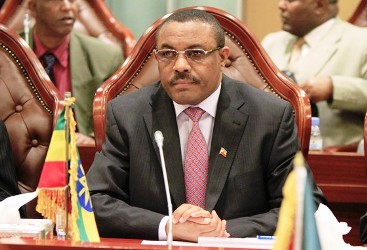ICG: ‘Tougher love’ needed for Ethiopia’s new leader
August 27, 2012 (NAIROBI) – The international community will need to be tougher with the successor to Meles Zenawi’s leadership of Ethiopia to prevent negative consequences at both national and regional levels the International Crisis Group (ICG) has said in a report published on 22 August.

Zenawi and his predominantly Tigrayan clique from the north of the country, ruled Ethiopia since 1991 after toppling the Communist Derg regime of Mengistu Haile Mariam.
Hailemariam Desalegn, tasked to carry on Meles’s duty until 2015, will lead a weaker regime facing mounting grievances along ethnic and religious lines and a likely increase in radicalism, the group said.
“Meles adroitly navigated a number of internal crises and kept the different TPLF [Tigrayan People’s Liberation Front] factions under his tight control”, says Emilio Manfredi, ICG’s Ethiopia analyst.
“Now that he’s gone, the weaknesses of the regime that he built are more likely to be exposed, and the repercussions could be felt across the region”.
ICG said the new government in Ethiopia will most likely be more fragile causing a massive impact across the region.
Accordingly, increasing internal instability could threaten the country’s role as the West’s key counter-terrorism ally in the Horn of Africa, putting into question its responsibility to military interventions in neighbouring Somalia and Sudan. It could further exacerbate tensions with arch foe Eritrea.
Divisions along ethnic and religious groups, could make the political system and society more unstable.
Should ethnic and religious extremism grow which possibly would link with other external armed radical Islamic groups, Ethiopia will, without Meles, fight back to control unrest that could easily spill beyond its borders.
Zenawi’s government was under increasing pressure due to intensifying repression of political, social, and ethnic and religious liberties and ICG analysts say that his Tigrayan elite could be forced to use more repression to keep control of other ethnic groups.
The government has also been been accused of stifling press freedom which eventually drove dozens of journalists into exile and gave others lengthy jail terms.
His successor, Desalegn, is seen as a more moderate figure, but analysts do not expect him to loosen his grip on the press.
“There are hard-liners in the [ruling] party and they wield a lot of influence,” Mohammed Keita of the Committee Protect Journalists told Voice of America.
“I don’t think Hailemariam is a hard-liner, but I’m sure he’s under a lot of pressure so I don’t know if he’ll have a chance to really break with the past.”
ICG noted a need from the West to extend political, military and development assistance to the opening of political space and an end to repressive measures further stressing the new Ethiopia leadership is shaped to lead an all-inclusive political landscape by conducting fair and free elections.
(ST)
